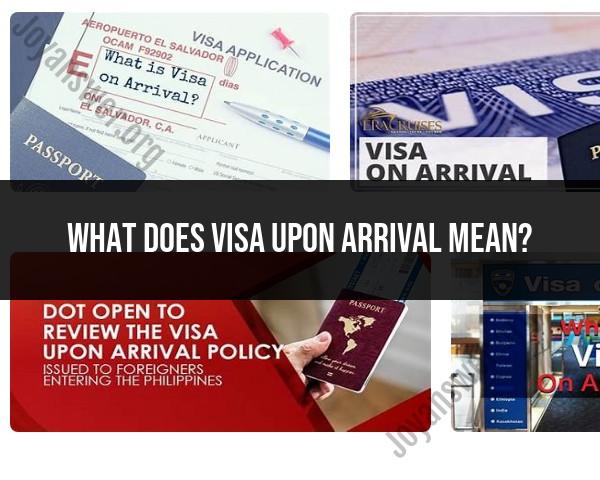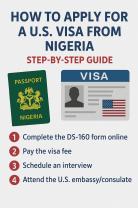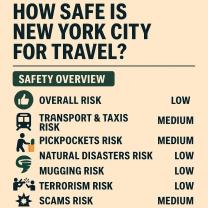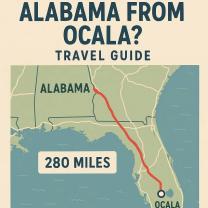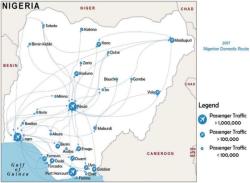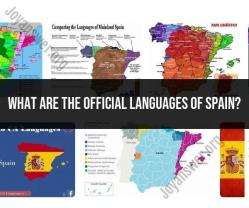What does visa upon arrival mean?
"Visa upon arrival" refers to a type of visa that is obtained at the destination country's entry point rather than in advance at an embassy or consulate. Travelers who are eligible for a visa upon arrival can receive the visa when they arrive at the airport, seaport, or border crossing. This allows individuals to enter the country without obtaining a visa in their home country beforehand.
Here are key points regarding "visa upon arrival":
Meaning:
Issued at the Entry Point:
- A visa upon arrival is issued to travelers upon their arrival at the destination country's entry point, such as an airport or border crossing.
No Need to Apply in Advance:
- Travelers do not need to apply for this type of visa in advance at an embassy or consulate. The application and approval process take place upon arrival.
Immediate Processing:
- The processing of a visa upon arrival is usually relatively quick, allowing travelers to complete the necessary paperwork and obtain the visa shortly after reaching the destination.
Procedures:
Eligibility:
- Check if you are eligible for a visa upon arrival in the specific country you plan to visit. Not all countries offer this option, and eligibility criteria may vary.
Documentation:
- Prepare the required documents, which may include a valid passport, completed visa application form, passport-sized photos, and any other documents specified by the destination country.
Arrival at Entry Point:
- Upon arrival at the destination's entry point, proceed to the designated visa counter or immigration area where visa upon arrival services are provided.
Application Submission:
- Submit the required documents and complete the visa application form. Some countries may require payment of a visa fee, which is often payable in local currency or, in some cases, in U.S. dollars or euros.
Processing and Approval:
- The immigration authorities will process the visa application, and if approved, the visa will be stamped or attached to your passport.
Duration and Conditions:
- The visa upon arrival may have specific conditions, such as a maximum allowed stay duration or restrictions on certain activities. Be sure to understand and comply with these conditions.
Departure Card:
- In some cases, travelers receiving a visa upon arrival may also be required to fill out a departure card that needs to be submitted upon leaving the country.
Important Considerations:
Check Requirements in Advance:
- Before traveling, check the visa requirements of the destination country and confirm whether a visa upon arrival is an option for your nationality.
Payment Methods:
- Be prepared to pay the visa fee in the accepted currency, and check if credit cards or other payment methods are accepted.
Validity Period:
- Be aware of the validity period of the visa and the allowed duration of stay. Overstaying a visa can result in penalties or legal consequences.
It's essential to research and understand the specific procedures and requirements for obtaining a visa upon arrival in the country you plan to visit, as these can vary significantly from one destination to another. Always refer to the official government or embassy website of the country you are visiting for the most accurate and up-to-date information.
A "visa upon arrival" (VOA) is a type of visa that is issued to foreign nationals at the entry point of a country. This means that travelers do not need to apply for a visa in advance of their travel. Instead, they will be issued a visa upon their arrival in the country, typically at the airport or border crossing.
The process of obtaining a VOA is typically straightforward and involves presenting your passport, travel documents, and any required fees to an immigration officer. The officer will then review your application and, if approved, issue you a visa. The visa will usually be valid for a short stay, such as 30 or 60 days, and may be subject to certain conditions, such as not working or engaging in certain activities.
VOAs are a convenient option for travelers who do not have the time or resources to apply for a visa in advance. They are also a good option for travelers who are unsure of their travel plans, as they can be obtained at the last minute. However, it is important to note that not all countries offer VOAs, and some countries have strict requirements for obtaining a VOA.
Here are some of the benefits of VOAs:
Convenience: VOAs can be obtained at the entry point of a country, without the need to apply in advance.
Flexibility: VOAs can be a good option for travelers who are unsure of their travel plans.
Cost-effectiveness: VOAs are often less expensive than visas that are applied for in advance.
Here are some of the drawbacks of VOAs:
Not all countries offer VOAs: Not all countries offer VOAs, and some countries only offer VOAs to citizens of certain countries.
Strict requirements: Some countries have strict requirements for obtaining a VOA, such as proof of onward travel or sufficient funds.
Processing times: Processing times for VOAs can vary depending on the country and the number of travelers arriving at the entry point.
Overall, VOAs can be a convenient and cost-effective way to enter a country. However, it is important to research the VOA requirements for the country you are visiting before you travel, and to be prepared to meet those requirements.
